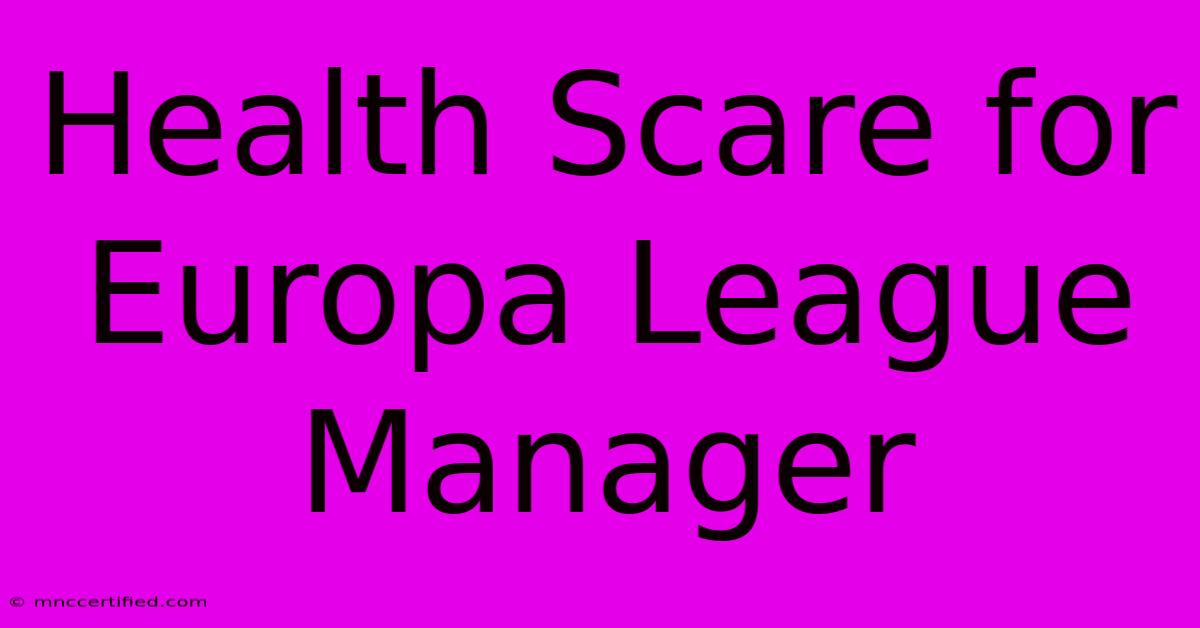Health Scare For Europa League Manager

Table of Contents
Health Scare for Europa League Manager: A Worrying Trend?
The football world was recently gripped by concern following a health scare involving a prominent Europa League manager. While specifics surrounding the manager's identity and the nature of the scare are often kept private for reasons of patient confidentiality, these events highlight a wider issue: the immense pressure and demanding lifestyle faced by managers in professional football, potentially impacting their health. This article explores the pressures, potential health risks, and the importance of prioritizing well-being in this high-stakes environment.
The High-Pressure World of Football Management
Europa League management, even outside the Champions League spotlight, is incredibly demanding. Managers face intense pressure from:
- Results: The relentless pursuit of victory creates significant stress, impacting both mental and physical health. Poor results can lead to job insecurity, adding further pressure.
- Media Scrutiny: Constant media attention, often critical, can take a toll on a manager's mental well-being. Public opinion and criticism are a constant presence.
- Player Management: Dealing with diverse personalities, managing team dynamics, and navigating player injuries and form requires significant emotional and mental energy.
- Travel: The extensive travel involved in European competitions adds further strain, disrupting sleep patterns and contributing to fatigue.
- Long Working Hours: The job extends far beyond match days, encompassing tactical analysis, training sessions, player recruitment, and media engagements.
Specific Health Risks for Managers
The cumulative effect of these pressures can manifest in various health problems:
- Cardiovascular Issues: Stress is a major risk factor for heart disease. The pressure of managing a football club can significantly elevate stress levels, potentially leading to heart problems.
- Mental Health Problems: Anxiety, depression, and burnout are common among those in high-pressure professions. Football management is no exception. The constant scrutiny and pressure can severely impact mental health.
- Sleep Deprivation: Irregular work hours and travel significantly disrupt sleep patterns, leading to fatigue, decreased immunity, and increased risk of various health problems.
- Substance Abuse: In an attempt to cope with stress, some managers might turn to unhealthy coping mechanisms, including substance abuse.
The Importance of Prioritizing Well-being
Football clubs and governing bodies need to recognize the importance of prioritizing the well-being of their managers. This includes:
- Providing Access to Mental Health Support: Offering readily available and confidential mental health services is crucial. Reducing the stigma associated with seeking help is equally important.
- Promoting Work-Life Balance: Encouraging managers to prioritize rest and downtime is essential. Implementing strategies to help manage workload and minimize travel stress can be beneficial.
- Open Communication: Creating a supportive environment where managers feel comfortable discussing their challenges without fear of repercussions is key.
- Regular Health Check-ups: Mandatory health screenings could help identify potential health problems early on, allowing for timely intervention.
Conclusion: A Call for Change
The recent health scare serves as a stark reminder of the demanding nature of football management. The footballing world must take proactive steps to improve the well-being of its managers, creating a more supportive and sustainable environment that prioritizes their health and mental well-being alongside results. Only then can we ensure the long-term health and success of those who contribute so much to the beautiful game. The focus should shift towards a holistic approach, recognizing the crucial link between mental and physical health, and the impact of sustained high-pressure environments. This is not just about individual responsibility; it's about a collective responsibility to protect those who dedicate their lives to the sport.
Keywords: Europa League, Football Manager, Health Scare, Stress, Mental Health, Pressure, Well-being, Cardiovascular Health, Burnout, Sleep Deprivation, Football Management, High-Pressure Jobs, Player Management, Media Scrutiny, Health Risks, Wellbeing in Football.
Off-Page SEO Strategies:
- Guest blogging: Write guest posts on relevant sports blogs and websites.
- Social media marketing: Share the article on relevant social media platforms.
- Link building: Reach out to other relevant websites and request links to this article.
- Forum participation: Participate in online forums and communities related to football and health.
- Influencer outreach: Reach out to relevant influencers in the sports world to share or promote the article.
This comprehensive approach will enhance the article’s visibility and ranking in search results. Remember to update and refresh the content periodically to maintain its relevance.

Thank you for visiting our website wich cover about Health Scare For Europa League Manager. We hope the information provided has been useful to you. Feel free to contact us if you have any questions or need further assistance. See you next time and dont miss to bookmark.
Featured Posts
-
Top Winning Dog Breed National Dog Show
Nov 29, 2024
-
Sr22 Insurance North Carolina
Nov 29, 2024
-
Starbucks Thanksgiving Hours Florida Locations
Nov 29, 2024
-
Giants 7 3 Lead Lock And Nabers Impact
Nov 29, 2024
-
Homeowners Insurance Ocala Fl
Nov 29, 2024